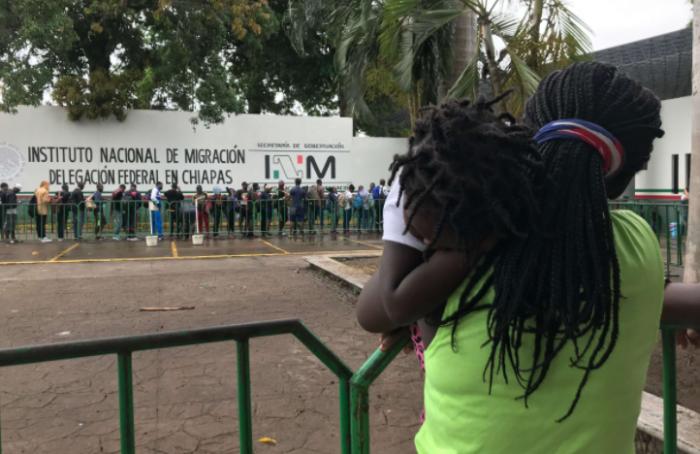Chiapas police lock up Haitian families and hand them over to the INM
Municipal police from Motozintla, Chiapas, locked several Haitian families in a cell and then handed them over to the National Migration Institute (INM), which later expelled them to Guatemala. The events occurred on August 15, according to one of the victims, who was traveling with his wife and his 20-month-old daughter. The man, who did not want to identify himself because he fears reprisals, recorded a video in which families, including young children, are seen crowded into a small room with bars. “The police from the municipality of Motozintla detained us and kept us locked up all night. We were 18 adults and 4 children. This is abuse,” he said.
Sources from the Motozintla mayor's office, who spoke on condition of anonymity, acknowledged that these arrests are a common practice. According to his version, in August there was a meeting of the municipalities of the southern border with the federal government, which gave the mandate to capture the migrants and hand them over to the INM. "There is nothing to hide, it is an indication at the federal level," said the source.
Lee: INM and National Guard dissolve fourth caravan; migrants disperse along roads
The arrest documented by Animal Politico occurred at 1:00 p.m. on August 15. Two Haitian families (in total, five adults and three minors) were traveling inside a taxi bound for Tuxtla Gutiérrez, although their objective was to reach Mexico City. At the height of Motozintla they were intercepted by municipal police officers, who ordered them to get out of the vehicle.
“The police told us that Haitians cannot cross, that the law says so,” explains the man.

The policemen took them to the Motozintla police station, where they locked them in one of the cells. There, 18 adults and four children were crowded together, including a three-month-old baby. “The municipal police do not have that power. I wasn't stealing, I wasn't doing anything wrong. They take me out of a taxi and they keep me one night, with the girl crying, without a bed, without water, without anything. 22 people in a two meter room. What is that?” he protests.
The Haitian says that those who managed to fall asleep slept on the floor. That the room was dirty and that they did not have water to clean the bathroom when someone relieved themselves, so there was a very bad smell.
“I yelled at them: this is an abuse, they have no heart,” he assured.
Find out: Arrests, confrontations and raids: the hunt for migrants that occurs in Chiapas
They were locked up for more than 24 hours, according to this testimony. Later, at 4:00 p.m. on the 16th, INM agents arrived and took them to the border with Guatemala, specifically to the La Mesía pass. It was not the first time that the man had been expelled to the Central American country. Days ago he was also captured in Tapachula, where he lives with his wife and his daughter. “They caught me with diapers, baby milk and wet wipes. They sent me to Guatemala. But I'm not from Guatemala!” he complains.
After spending the night at the border, the Haitians took a bus back to Tapachula. The mandate is to prevent them from traveling north, but they are allowed to go back.
“A municipal police officer told me that it was not his fault, but the government's, which gives the orders. This does not happen in any country in the world! Lock up children? I don't know what's going on with the Mexicans!” he said.
Authorities confirm arrests
Sources from the Motozintla city council confirmed to Animal Politico that these arrests are being recorded. According to this version, the federal government would have asked for support from municipalities in the area such as Comitán, Frontera Comalapa, Huixtla and Motozintla itself to collaborate in the migrant detention strategy.
"When they are arrested it is because they commit some crime, such as scandalizing," said this source. However, he later acknowledged that there was an instruction to arrest migrants who try to cross through the municipality, prevent their passage and hand them over to the INM. “There is nothing to hide, it is a collaboration law,” he said.
Read more: Government says that migrants in an 'irregular' situation; have tripled, compared to 2020
Political Animal consulted the INM about these practices, which at the close of the edition had not issued a response.
The Migration Law, which was modified in January of this year, expressly prohibits the detention of children and adolescents. In fact, the INM insists that since January 11 there is no longer any minor housed in its facilities.
The victim of the detention explained that she arrived in Tapachula from Haiti two months ago. Since then he has tried to regularize his situation, without success. The only alternative he received was to ask for asylum before the Mexican Commission for Refugee Assistance (Comar), but since he is collapsed he does not have an appointment for another week. Nearly 20,000 Haitians applied for asylum in Mexico in 2021 alone, according to data from Comar. It is the second nationality that made the most requests for protection this year, only surpassed by Honduras.

